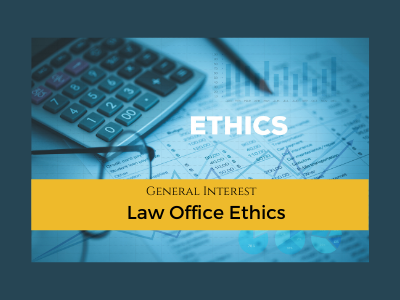
By Lynne Prescott, CCLS, LPI President
Lawyers depend on their staff to perform a great deal of increasingly complex and sophisticated tasks, an arrangement that is beneficial to both the lawyer and the client and is universally recognized as appropriate. However, the relationship between the lawyer and support staff is more than simply employer/employee. The mere fact of working in a law office immediately confers the status of a public representative of a professional person. Regardless of the duties performed in a law office, or who performed them, under the Rules of Professional Conduct of the State Bar of California, they are treated as if performed by the lawyer. To put it simply — the lawyer is responsible for the acts of his or her employees, and the employees are bound by the same code of ethics as the lawyer.
It is extremely important that staff recognize that dealings with clients, other lawyers, the courts, and the public are not just reflective of the lawyer but can actually be equated with the lawyer. This means that the legal support staff, as extensions of the attorneys they work for, must conform their behavior to the same ethical obligations as an attorney. And while it is true that it is the attorney who ultimately faces potential disciplinary action or malpractice liability for a violation of ethics, support staff undoubtedly share an interest in avoiding ethics issues.
The most important thing to remember is that everything you learn in the law office is confidential. Working in a law office is exciting, and you may learn all sorts of interesting things about prominent or well-known people in the community. It can be tempting to disclose some of this information to outsiders (including a spouse or family members). It is a natural response because it makes us feel important to be able to convey knowledge that others don’t have. Revealing information obtained through your employment can be extremely harmful and/or hurtful to other people. Consider the following scenario:
One afternoon you see the son of an old friend of the family in the office who has an appointment for a legal consultation. You engage in a brief conversation about non-legal matters, say goodbye, and return to your desk. Two weeks later, you bump into the client’s mother at the grocery store and during the course of conversation you innocently mention that you ran into her son at your office a couple of weeks ago. Knowing that you are employed with a criminal law defense firm, the client’s mother then approaches her son about his reasons for being in your office and learns that he had recently been involved in a DUI incident. The client was a legal adult and had every right to keep the matter private (even from his own mother), but you have accidentally revealed this confidential information.
Besides being harmful, failing to maintain client confidentiality can also result in a complaint to the State Bar, or worse, a claim for malpractice against the attorney. Further, it could also mean discharge from your employment and the likelihood that you will not be hired by another law firm.
A situation that often arises with legal support staff is when family, friends, or acquaintances find out you are working in a law office and assume you must know all about the law and ask you for legal advice. Additionally, as a result of developing a good working relationship with clients, they may ask you questions that would require the advice or opinion of an attorney. The information you have learned while working for the lawyer can become such second nature that you may forget it can be construed as legal advice. Regardless of the confidence, you may have in your response, answering such questions violates the unauthorized practice of law statutes (unless it is the exact legal opinion of the attorney and you have been given permission to communicate it). This includes the preparation of legal documents, which should always be under the direction, supervision, and review of an attorney.
The responsibility for ensuring that legal support staff is in compliance with the Rules of Professional Conduct should not be absorbed only by the lawyer. Support staff need to insist on proper supervision, training, and review to protect not only the attorney, but themselves and the client. You are ultimately responsible for your own education, growth, and role in the law office. Don’t be afraid to ask questions or seek the guidance of those who have more experience.
You are a professional in a professional field, representing a member of one of the oldest, most respected professions in a civilized society. Always conduct yourself accordingly, with pride and integrity.
Categorized in: General
| << previous | next >> |








